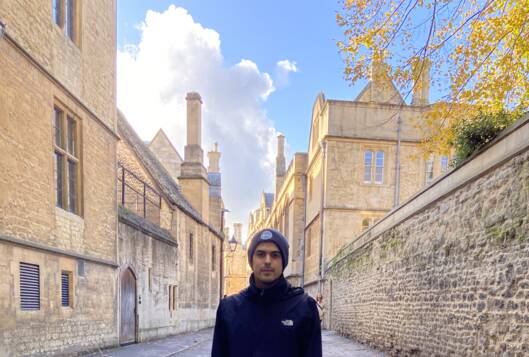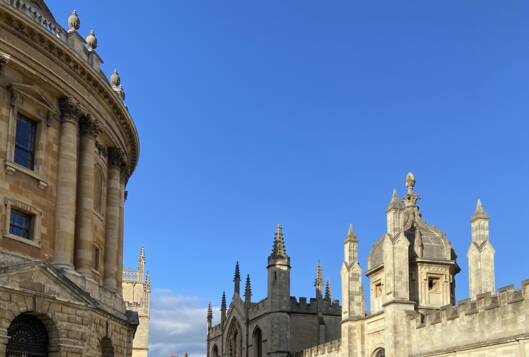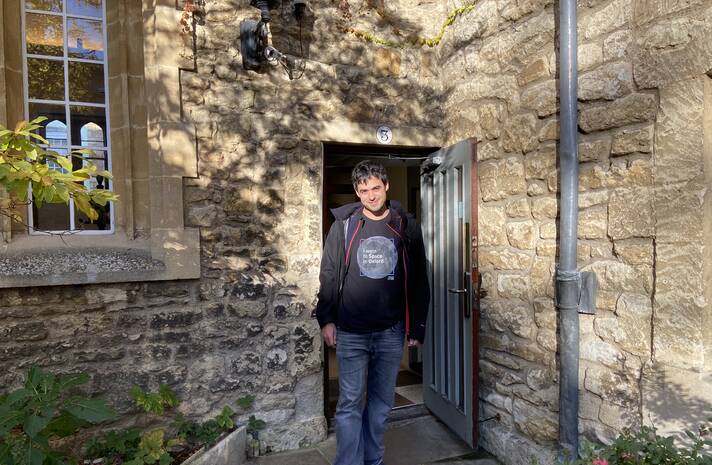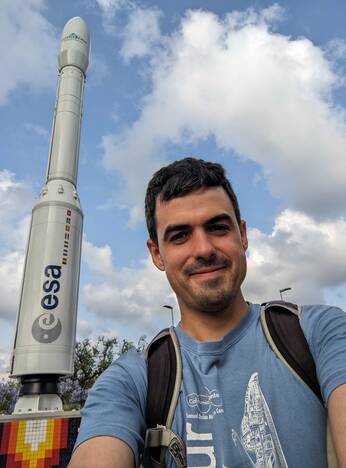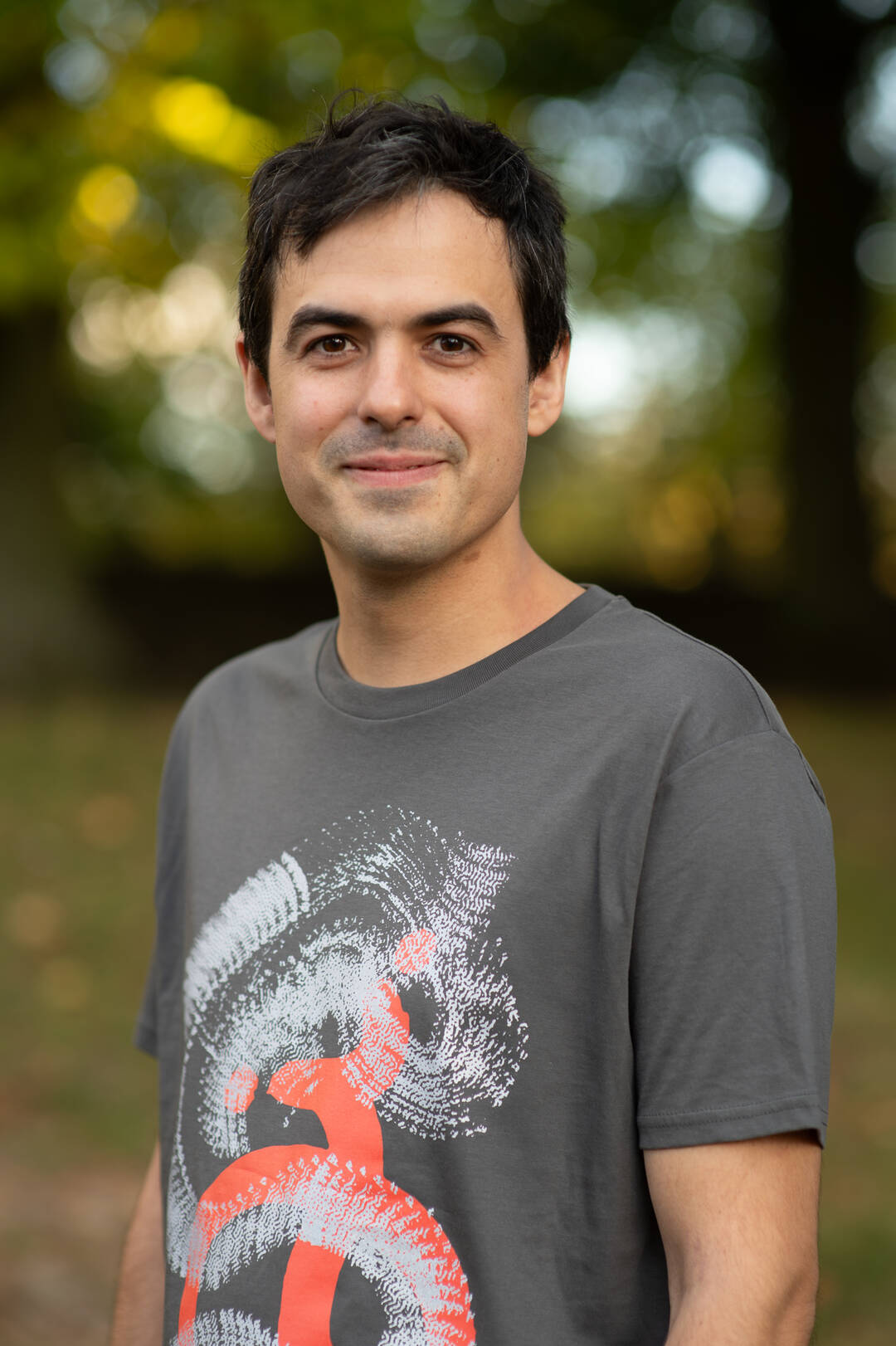From FEL to Oxford
Where did you originally come to FELU from? Did you have any specialisation during your secondary school studies?
I came from a grammar school, specifically from the Prague Gymnasium at Vítězná pláni. I wasn't sure about a particular major, but I enjoyed computer science and mathematics and got into the Open Computer Science program. The course taught by Associate Professor Habala from the Department of Mathematics also helped me. He was very good at explaining even more advanced mathematics, which helped me both during the entrance exams and later during my studies. Mr. Associate Professor was my favourite teacher during my undergraduate studies, he was great at explaining things and generally taught very pleasantly.
What do you remember about your studies at FELU? What did it bring you?
I have fond memories of my student years, I studied both BA and MA at FEL. I finished my bachelor's programme in due time, my master's programme was extended due to studying abroad. However, the foreign experience helped me a lot to broaden my horizons and later in my studies at Oxford. But back to our school: I would like to praise FEL, I feel in retrospect that during my studies most of the content was well explained, and although OI was sometimes a bit too theoretical or complicated, it helped me in my further studies. It wasn't so hard to then move on to a new discipline, for example a new programming language. This was especially true when I focused on machine and deep learning towards the end of my master's program. I was writing my thesis on it and the strong theoretical foundation came in handy.
How is studying abroad different from studying here? And in what ways do you think your studies at FEL prepared you best for studying at Oxford?
On a theoretical level, there were many opportunities to choose your own path at FEL. During my studies, I took courses in computer graphics, so I was exposed to, for example, methods of processing and representing 3D data and computer vision. One of the things that was perhaps a bit lacking for me was the applied lectures, or the opportunity to better see that what is taught in theory can be beautifully applied in practice in a specific industry. At Oxford, I noticed, for example, the undergraduate programme "Computer Sciences and Philosophy", which attracted me because it has overlap with other disciplines. On the other hand, similar things can be solved by enrolling in electives (even at other schools) or just studying abroad. What also prepares a person well for applying abroad is the reputation of our school. For example, just at Oxford there is already a good awareness that we have a very good Computer Vision lab, and it is also more or less known about our Computer Graphics labs.
Do you think that personal acquaintances and awareness of the research we conduct also play a role?
I would say yes. But be careful, it's not the actual contacts, it's just the fact that our research groups are known around the world, that they publish at well-known conferences, and that even foreign scientists know about them. And one more tip for students who might be interested in being inspired by my path: At the end of my master's degree, I got to go abroad thanks to AESTE, which is a program that helps students find jobs after their studies. This gave me the opportunity to participate in research at Carnegie Mellon University. This was great because I was able to experience PhD life there with all the successes and dead ends, both in work and in life. It was basically a good test to see if I would enjoy research. And in the end the output, or rather the paper I presented at the conference, came out of that. This experience helped me a lot in my application to Oxford because my future supervisor introduced a talk on it.
Was there anything you missed from FEL abroad?
As I mentioned, I tried to focus on other fields abroad than computer science, for example, I studied Photography at Union College in the USA, and Indian Drama at IITM in India. On the other hand, the level of technical subjects was surprisingly not as good as I knew it from the Czech Republic. It is probably mainly due to the specialization of our school and the fact that we have really top experts in their fields. But I think it's also because I found myself in schools that didn't have computer science as a major.
Would you venture to compare the level of computer science here at FEL and at Oxford?
I'm sorry, I don't think I would. (laughs)
Also, just in Deep Learning, a lot has changed after I left FEL, so I didn't come across some of the concepts until later - e.g. the current revolution in NLP (natural language processing) and the greater focus on so-called XAI (explainable artificial intelligence). But the solid theoretical knowledge from OI and from FEL helped me to be able to teach myself from the latest published papers.
Multidisciplinary approach and the place of computer science in real life
Do you think that many computer scientists, or students of technical disciplines, have a need to go beyond the boundaries of their field and look for a deeper meaning of their work in other disciplines, or rather sciences?
Absolutely. Or at least I hope so. It's important for me too, because I need to see the meaning of my work. I think it's also a cure for burnout and feelings of hopelessness. Of course, one person can't save the whole world, but they can see the real impact of their work. As for multidisciplinarity, I see it in myself in two aspects. I try to work as a scientist and as an artist at the same time, and it's hard sometimes, changing minds, but it's interesting because if you get "tired" with one, you can "rest" with the other. And it simply brings new perspectives. For example, I recently screened an experimental film created using AI methods at the Ji.hlava festival, and I also participate in the so-called Lab Inspiration Forum program there. I find the discussion with people from other fields, and the chance to work across disciplines important and refreshing.
What is your opinion on the power of computer science today, given that it has already permeated most other fields?
Computer science will give you a chance to apply pretty much anywhere. You will encounter problems that can be solved by optimization or similar methods everywhere. You can have a much deeper motivation for studying computer science, and you don't have to worry about ending up "sitting in an office cubicle tapping away at a computer" like at the beginning of The Matrix.
Future prospects
Let's move on to your current job. In mid-November you published a paper "Semantic segmentation of methane plumes with hyperspectral machine learning models". Could you briefly introduce it?
The article was published in the journal Nature, or rather in its sub-journal Scientific Reports. One of the features of this journal is that it is designed to make articles understandable to experts from other disciplines, so it must not be overly technical. Since I was trying to move between disciplines, I found this ideal. The topic of the article is methane signal detection using so-called hyperspectral satellites. Nowadays there are more and more missions from different agencies, such as ESA or NASA, that send satellites with hyperspectral sensors, so that they capture not only RGB channels, but many more (instead of 3 channels, for example, up to 425). This allows to capture much finer types of signals, but also brings its own specific problems. In addition, methane detection is quite complicated because methane is transparent and not visible in the images from many satellites. On the other hand, its concentration is a problem that is currently very important to address because methane leaks contribute to global warming. Another new feature of the paper is that the data is detected and evaluated by artificial intelligence, and some disturbing elements are automatically filtered out. The data in the paper was captured in America, in the Four Corners area, where there are many factories and therefore methane producers, but the model is then tested on data from another sensor and from other areas of the world. It is also important to me that we were able to process this data and release it publicly for other potential scientists working in this area.
The link to the paper is: https://www.nature.com/articles/s41598-023-44918-6.
What is the future of this research?
The next step I would like to focus on is to expand data collection around the world and train models that can handle the diversity of data from around the world. The first step will probably be to use simulations, but I would like to see this method of data processing and analysis expanded.
Many of your previous projects have been either fire detection or other extreme situations in nature. Does any kind of environmental distress fall on you because of your research?
Seeing some of the data is, of course, quite difficult. Scientists sometimes commit a kind of dehumanization in their research, focusing on method and signals rather than practical implications. It is, of course, a way to better protect ourselves mentally. I, on the other hand, am optimistic that the generation of today's children and adolescents are no longer even questioning whether we are going through a climate crisis at all, but are motivated to address it and will try to accelerate the solution.
As for the future, some students might like to follow your path. What other advice would you give them?
I can certainly give some advice. One of them, although it may not sound popular, is to take care of your academic average, even if it means retaking some exams so that they come out better. Then, as I mentioned, it's important to try internships and study abroad, especially if there are specific outcomes that can come out of them. Among other things, these experiences will give one motivation and outlook outside the existing zone. Then when one returns from abroad, one takes positive inspiration from there. Practically, then also, find more goals and accept that some will not work out (I speak from the experience of about two years of failed admissions). So don't get discouraged and believe in yourself a little more. Personally, I think some FEL and OI students would quite easily "pass" even at Oxford University.
And once again, back to you yourself. Where do you see your future in the next few years?
As PhD studies are quite demanding, I am still working on other projects, which I have about one academic year to complete. However, I would like to continue my academic activities, I also found that I enjoy both research and teaching for example, where I can pass on my enthusiasm and motivate other students for the field. And I would also like to return to the Czech Republic again one day.
Interview conducted by Tereza Čechová and Radovan Suk

